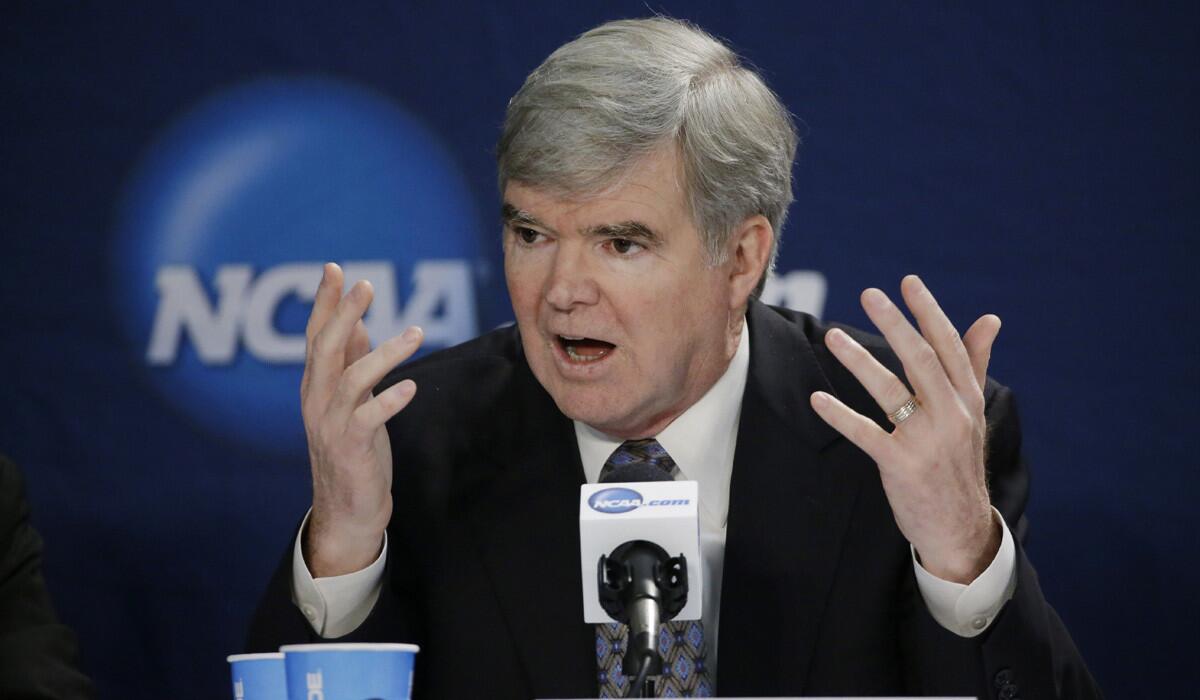What to expect when NCAA President Mark Emmert takes the stand

NCAA President Mark Emmert addresses the media during a news conference before the NCAA board of directors meeting on April 6.
- Share via
Reporting from Oakland — As NCAA President Mark Emmert takes the stand Thursday in the landmark antitrust lawsuit against the 108-year-old association, much sparring on “the revered tradition of amateurism in college sports” is expected.
That characterization, articulated in a previous court ruling, is at the heart of the NCAA’s defense of its rules barring student athletes from benefiting financially from the use of their names, images and likenesses.
And those rules are at the heart of the class-action case filed on behalf of former and current men’s basketball and football players, who are seeking an injunction against the NCAA that would effectively allow them to profit from the use of their names, images and likenesses in television broadcasts, rebroadcasts, video games and more.
Filed by lead plaintiff and former UCLA basketball star Ed O’Bannon five years ago, the case alleges that by agreeing on a blanket prohibition on commercial benefit to student athletes, the NCAA and its member colleges and conferences engage in price-fixing and refusal to deal, in violation of the Sherman Act.
Emmert, the face of the NCAA and a fierce advocate of amateurism, is scheduled to take the stand on the ninth day of the bench trial in U.S. District Court in Oakland, with Judge Claudia Wilken presiding.
Because both sides sought Emmert’s testimony, he will effectively serve as a dual witness -- meaning that each side can question him extensively on all topics relevant to their case. He follows testimony from O’Bannon and two other former student athletes, as well as a spate of experts in economics, sports broadcasting deals and more.
An NCAA spokeswoman who confirmed Emmert’s pending testimony said the association would “not have any statements previewing” it. A plaintiffs attorney also declined to discuss his team’s likely focus with Emmert. However, trial briefs and the testimony in the trial to date provide a likely road map.
Plaintiffs have discounted the NCAA assertion that rules restricting students from sharing the windfalls of the multibillion-dollar collegiate sports industry are essential to protecting the sanctity of “amateurism,” calling it “an ambiguous and shifting term that [the NCAA] uses to defend the restraint.” They also dispute the NCAA’s position that amateurism is key to maintaining “competitive balance” among collegiate sports teams and is vital to consumer demand for the sports.
Both sides are likely to question Emmert on those issues, with plaintiffs pointing to purported hypocrisy: Division I men’s football and basketball are professional in every respect, they noted in their trial brief, “with one exception: payments or agreements to pay players (beyond concerted limits on scholarships) are prohibited.”
They are also likely to question Emmert about an array of NCAA documents and reports that point to what they contend is a disingenuous position on amateurism. “Amateur defines the participants,” one such document notes, “not the enterprise.”
Emails from former longtime NCAA policy advisor Wally Renfro in 2010 to Emmert, then the incoming president, will likely make another appearance, demonstrating that the NCAA has long wrestled with the rising public perception of “commercial exploitation” of student athletes. (They were presented in court last week during cross-examination of an NCAA witness.)
“It’s a fairness issue and along with the notion that athletes are students is the great hypocrisy of intercollegiate athletics,” Renfro wrote to Emmert.
While plaintiffs contend that NCAA players are athletes first and students second, the NCAA asserts that they are students who play sports as an avocation and whose athletic activities are an integral part of their overall educational experience.
Emmert is likely to speak to that experience, and the NCAA assertion that it would be radically altered if student athletes were professionally compensated.
“The NCAA’s witnesses will explain that the rules at issue here -- the rules prohibiting payments to [student athletes] for their NIL [name, image and likeness] -- are designed to maintain the NCAA’s core product of amateur athletics,” the defendants wrote in their trial brief.
“These and other rules are promulgated by an entire Amateurism Cabinet, which is comprised of college administrators and educators and guided by the principle that ‘student participation in intercollegiate athletics is an avocation, and student-athletes should be protected from exploitation by professional and commercial enterprises,’” the defendants wrote.
The case is being tried as the concept of amateurism is assailed in other quarters: Northwestern University football players are pressing to form a union to seek larger scholarships and better medical care as university employees. Another case, also headed for Wilken’s courtroom, aims to end the NCAA’s cap on athletic scholarships, contending that they do not cover the full cost of attending school.
More to Read
Go beyond the scoreboard
Get the latest on L.A.'s teams in the daily Sports Report newsletter.
You may occasionally receive promotional content from the Los Angeles Times.











